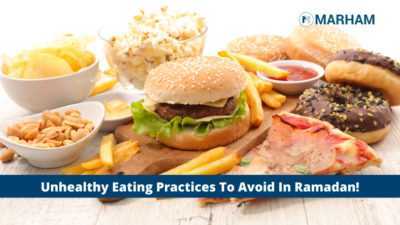Ramzan is all about blessings. Muslims worldwide love to worship, pray and eat during this month. This month is all about blessings; everyone wants to cherish them by celebrating the festivities according to their culture and traditions. But unhealthy eating practices are something that can make your Ramadan unpleasant. If you want to know how to avoid them, read this article till the end!
People like to eat different savory, sweet dishes and enjoy various drinks. The dining tables are full of different kinds of meals at the time of suhoor and iftar. People give sadaqah and zakat during this month of blessings to help those who cannot afford their daily meals. So that every Muslim can understand and enjoy the real meaning of Ramadan.
But the important thing is that choosing your food items for your meals during this month should not harm your health. If unhealthy eating practices make you sick, you cannot offer your prayers with the devotion that you want.
How Can Unhealthy Eating Practices Harm Your Health?
Unhealthy foods are usually more attractive and delicious. Everyone loves to eat junk food, fried items, savories full of spices, and many sugar-filled meals. But those who know the worth of their health do not indulge in unhealthy eating practices during Ramadan.
Unhealthy eating practices can lead to serious health issues during Ramadan. When your stomach remains empty for the whole day during fasting, you should fill it with a healthy diet to give it the proper time to digest the food. Oily and spicy foods make your stomach do overwork, and that increases the acidity in your stomach and disturbs your whole digestive system.
Similarly, unhealthy eating practices also cause constipation and bloating, which is a very unpleasant condition during Ramadan.
Oily foods with spices also increase your blood pressure and are bad for your cardiovascular system.
On the other hand, sugar-loaded foods and drinks are also bad for your health and may lead to diabetes.
Unhealthy Eating Practices To Avoid In Ramadan:
Unhealthy eating practices can be easily avoided during Ramadan. You only have to opt for good eating habits to stay healthy in this blessed month. Here are the unhealthy eating practices to avoid during Ramadan;
Overeating:
Overeating in both sahoor and iftar is not suitable for your health. Eating parathas and spicy curries in sahoor is not a healthy option. Similarly, overeating at the iftar table with fried items like pakoras, samosas rolls, etc., is also very harmful to your health. Try to bake your meals or use oil-free recipes to make your food.
It is better to make a simple menu for your iftar to control your temptations. Do not prepare so many savory and sweet items, otherwise, this will only end in overeating.
Do Not Eat Junk Food:
With the availability of so many fast food options and home delivery facilities, people love to order their favorite pizza or burgers during Ramadan. But junk food that is only full of calories is very harmful to your health.
Your digestive system is also affected by junk food. During Ramadan, your body needs more hydration, as your body has to perform all its tasks typically during the fasting phase. So if you consume more junk, you may suffer from constipation, and on the other hand, your blood pressure can also rise due to high-calorie food.
So try to avoid junk food as much as you can during Ramadan.
Also read: How can you lose weight in Ramzan?
Avoid Caffeine:
Caffeine acts as a diuretic and causes frequent urination. During fasting, caffeinated drinks may cause dehydration. So try to avoid coffee and more teacups during Ramadan.
Avoid Too Much Water:
Too much water intake at the time of sahoor may also cause a problem for you. Many people drink too much water, leading to imbalance indigestion.
On the other hand, your stomach becomes complete with water, making you unable to eat correctly.
Skipping Meals:
Many people skip their meals at the time of sahoor. And only drink water at that time. This is not a good practice. It will not help you to reduce your weight and instead deteriorate your health. It is essential to eat a proper healthy meal at this time of sahoor so that your body can function properly during the fasting phase.
Apart from eating habits, some other lifestyle practices are also unhealthy during Ramadan. For example, smoking is detrimental to your health. During fasting, your body tries to eliminate as many toxins as possible. But when you start smoking after iftar, the same toxins again accumulate in your body.
In addition to that, a poor sleep-wake schedule can also affect your health and eating practices during Ramadan. You should get proper sleep at night to stay healthy and offer your prayers properly.
If you are facing any health related issues during Ramadan, you can find the best health specialists of Pakistan on Marham.pk platform. Book an appointment now to answer all your queries. You can book an appointment with the top general Physicians in Karachi through Marham by calling the Marham helpline: 0311-1222398 or by online booking facility through the website or Marham mobile app.
| Android | IOS |
|---|---|
  |
  |

